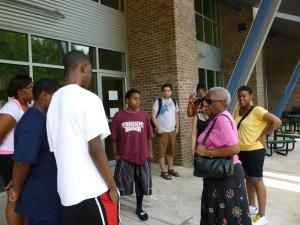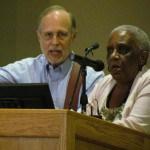By Alan Bean

Margaret Block recites poetry in Kosciusko, Mississippi
Margaret Block died on June 20, 2015 in Cleveland, Mississippi, the little town where she was born and raised. Margaret was a precocious teenager when she signed up as a disciple of Fannie Lou Hamer in the Mississippi Delta, but her heart had been in the justice struggle ever since Emmett Till was murdered and thrown in the Tallahatchie river in 1955. Margaret worked with SNCC in Tallahatchie County during the darkest days of the civil rights movement in the Mississippi Delta. Over fifty years later, Margaret would refuse to remain in Tallahatchie County after dark. “I still don’t trust those people,” she would explain, “you don’t know ’em like I do.”
I got to know Margaret Block when I was trying to figure out why Curtis Flowers, a young man from Winona, Mississippi, could have been convicted of murder on manufactured and flimsy evidence. Curtis was arrested in 1996, thirty-three years after Fannie Lou Hamer was beaten half to death in the County jail in Winona. I wanted to know how Mississippi society had evolved in those intervening years and my search took me to Cleveland, Mississippi. “If you want to learn about the civil rights fight in the Delta,” somebody told me, “you’ve got meet Margaret.”
Margaret Block lived in a modest home on the poor side of Cleveland; the same house where she was born and would eventually die. But there was a long stretch when she lived in San Francisco, a city as far from the Delta geographically and culturally as you could get. (You can find a tribute from an old friend from Margaret’s California period here.) Margaret worked as a school teacher in the Bay area but returned to Mississippi in later life to care for her ailing mother.
Margaret Block was fearless; she didn’t give a damn what anyone thought of her. She didn’t suffer fools gladly, but she was exceptionally forgiving. Explaining the freedom struggle in the Mississippi Delta to a dozen college students wasn’t easy, but Margaret gave it her best shot. Friends of Justice participated in several civil rights tours of the Delta with Margaret Block and our friends with the University of Florida’s Samuel Proctor Oral History Program. (They have a lovely tribute to Margaret on their site.)

Singing freedom songs with Margaret in Cleveland, Mississippi
Margaret had a strong alto voice and loved to teach freedom songs to young people. “These songs held the movement together,” she would explain. “People loved to sing, so we’d take these church songs and just change the words around a little. Instead of ‘I woke up this morning with my mind stayed on Jesus,’ we’d sing, ‘stayed on freedom.’ You can’t imagine what is was like to hear a church full of people singing these freedom songs at the top of their lungs. It made us bold; and you had to be bold to survive ’cause we were living in dangerous times.
Jaws would drop when Margaret would tell us how she got out of Tallahatchie County with the Klan on her tail. “They would search every car with a black driver coming and going,” she’d say, “but even the Klan had respect for a hearse, so that’s how we used to get people in and out of there when things got hot.”
Margaret was the champion of her brother, Sam Block, a man she clearly idolized, and her memories figured prominently in Sam’s New York Times obituary. When Margaret told her civil rights stories, Sam was always in the forefront. This excerpt from Taylor Branch’s Parting the Waters will give you a feel for Sam’s courage:
Block had acquired the reputation of a stubborn, lonely figure among the strange new breed of devout daredevils,” a reference to those activists who were unafraid to put themselves in jeopardy to register blacks to vote.
In one incident, a judge found Block guilty of making an incendiary public remark but said he would suspend Block’s sentence if he agreed to give up the voter registration project and leave town.
“Judge,” Block replied, “I ain’t gonna do none of that.”
So Block began a six-month sentence after paying a $500 fine. But his attitude and willingness to do the time galvanized local blacks. That night, according to Branch, more than 250 people gathered for a voting rights meeting.
But the most amazing Sam Block story came to light when I was filming with Margaret and a group of Friends of Justice interns at the LeFlore County courthouse in Greenwood. On Good Friday, in the spring of 1963, Margaret told me, her brother rode a mule into Greenwood on Good Friday morning.
“He told me about it one time as if it wasn’t anything important, but you’ve got to understand that Sam was sure he wasn’t going to survive the work he was doing in Greenwood–sooner or later, he believed, somebody was going to take him down. So, by riding that mule into town he was saying, ‘Look, you did it to Jesus, so, come on now people, why don’t you just go ahead and do it to me.”
Margaret had a love-hate relationship with organized religion, but she said that if “Ms. Hamer” loved Jesus so much he must have something going for him. Religion was one of the biggest impediments to the movement; but religion was also at the heart of the movement. Civil Rights Christianity didn’t survive the social trauma of the 1960s, but Margaret treasured the memory of its glorious and all-too-brief brief flowering.
“I wish you could have heard Ms. Hamer sing these old songs,” Margaret would say. “Now there was a true child of God. Fannie Lou wasn’t afraid of nobody and it was her faith that made her that way. Everybody remembers her for “This little light of mine,” but her favorite song was “I want Jesus to walk with me.”
Then Margaret would break into song as if channeling the spirit of Fannie Lou:
I want Jesus to walk with me;
I want Jesus to walk with me;
all along my pilgrim journey,
Lord, I want Jesus to walk with me.
And now Margaret is walking with Jesus, Fannie Lou, Sam, and that great cloud of witnesses on the freedom side of the river. Hallelujah!
